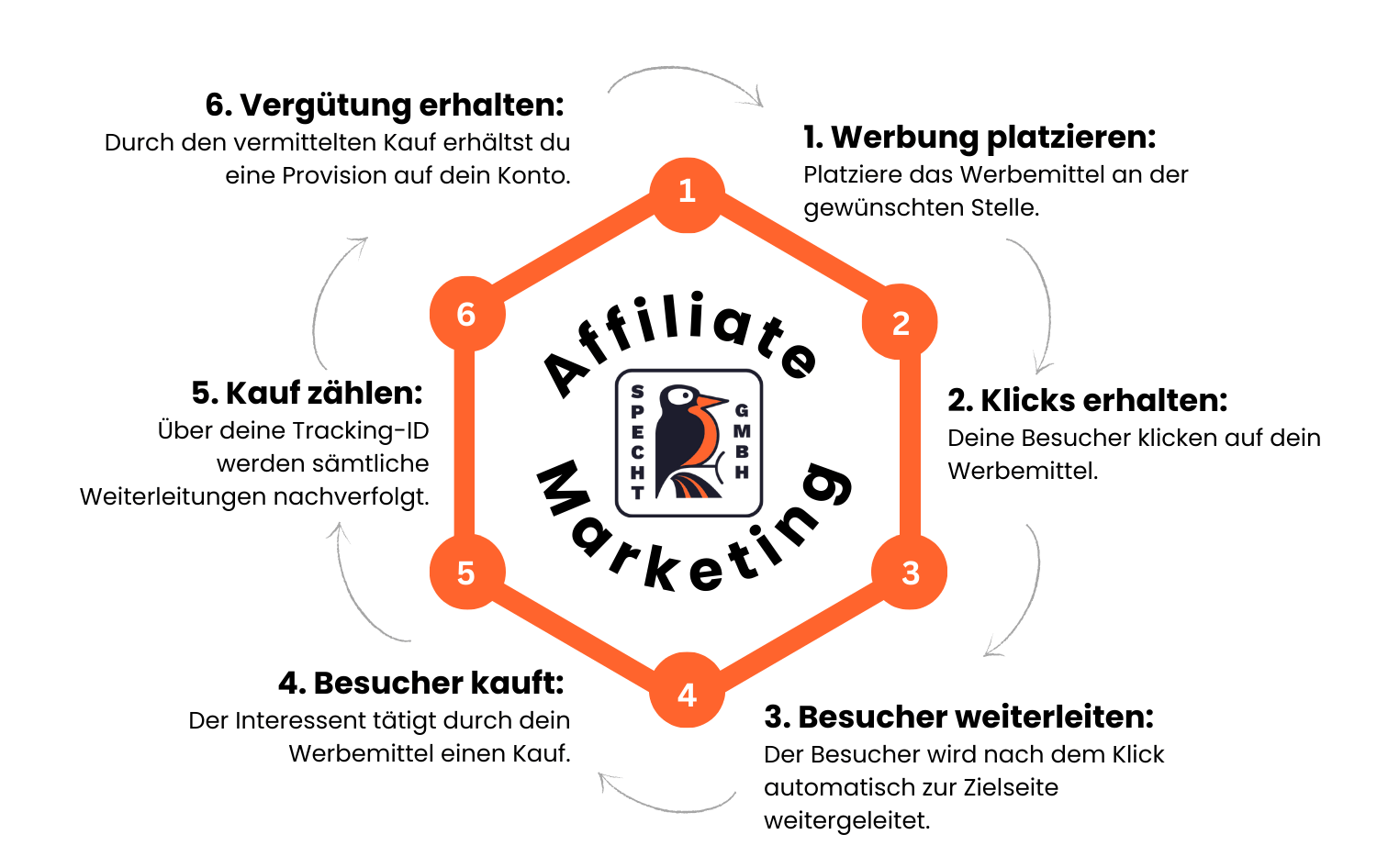In a nutshell: What is affiliate marketing?
Affiliate marketing is a business model in which website operators advertise the products of sellers. If users click on one of the affiliate links and buy a product from the seller, the website operators receive a commission for successfully referring a customer.
Definition: What is affiliate marketing?
Affiliate marketing is basically a collaboration between sales partners. The overarching goal is to sell products in order to generate revenue.
Affiliate marketing involves advertising products and services for which a commission is paid. As so-called affiliates recommend products and services to their community, affiliate marketing is also known as referral marketing.
Players: Who plays a role in affiliate marketing?
Various players come together in affiliate marketing. These are:
Merchant
The merchant is the advertising company that sells products or services. In order to generate more sales or leads, he uses the affiliate to help him and provides him with all the necessary advertising materials or tracking tools.
Affiliate (Publisher)
The affiliate acts as a partner of the merchant and promotes the merchant's products and services. Affiliates may be individuals with no particular reach on the Internet.
However, it is often bloggers, influencers or companies that use their traffic and direct it to the retailer's offers with their content.
Customer
The customers are the end users who reach the merchant's website by clicking on the link or banner advertised by the affiliate. If they carry out a desired action, such as a purchase or registration, the affiliate is remunerated accordingly.
How does affiliate marketing work in detail?
There are two parties in affiliate marketing: the affiliates and the merchants. Affiliates operate a website and do not sell their own products. They can be either one person or a partner company.
Merchants, on the other hand, are sellers who can be manufacturers of the products, distributors of the products or service providers.
The basic principle of affiliate marketing is that affiliates promote and recommend products from merchants. They therefore help to sell these products. In return, affiliates receive a commission.
Affiliates use their reach on social media or in their own blog to do this. They place corresponding links on their channels that consumers can use to purchase the product from the merchant.
Special affiliate links are used so that merchants know exactly which products have been purchased by end customers via which affiliate. They contain a unique code that is assigned to the publisher. This makes it possible to measure exactly which products were sold via which link.
There are three types of commission models:
- Cost per click (CPC): Click on the advertising material or link
- Cost per lead (CPL): Establishment of a business relationship / acquisition of data
- Cost per order (CPO) Cost per sale (CPS): sale of a product
CPO or CPS is probably the most common model in affiliate marketing.

Advantages of affiliate marketing: benefits for merchants and affiliates
Affiliate marketing offers a lot of advantages - both for the companies and for the affiliates.
Advantages for retailers
The aim of the companies is to make potential customers aware of their offer in order to increase their visibility and boost their sales.
Affiliate marketing increases these opportunities. At the same time, the risk for merchants remains low, as remuneration is only due to the affiliate in the event of success. Affiliate marketing is therefore a cost-effective and easily scalable form of online marketing for retailers.
Advantages for affiliates
Affiliate partners can primarily earn money through this form of advertising. Cooperation with the companies is therefore a passive source of income for them.
Thanks to the wide range of affiliate programs in different industries, they benefit from a flexible model that allows them to determine their own working hours and locations.
Affiliate marketing process
Affiliate marketing is a simple but effective model of online marketing that involves the following steps for the affiliate:
Registration
A suitable platform is needed to bring merchants and publishers together: an affiliate program that provides the technical infrastructure. Several such programs are integrated into affiliate networks and offer cooperation partners a large number of partner programs that match their target group and content.
To be approved, the publisher should usually meet certain criteria - for example, a minimum number of visitors to their website or a certain type of content on their social media channel.
Receive advertising material
If the affiliate is selected, they are given access to various advertising materials to promote. This usually involves an affiliate link.
In addition to affiliate links, the affiliate can also use banners, product images or videos. All these advertising materials are provided with integrated cookies. These not only track customer behavior, but also ensure which affiliate published the link in order to correctly assign the leads to them.
Promotion of products and services
In order to promote the merchant's products and services, the affiliate integrates the advertising material into the online landscape as naturally and appropriately as possible. This can be done in various ways.
For example, the affiliate can create blog posts on their website and include the affiliate link there to promote the respective offer. How-tos or product reviews on social media are also suitable for affiliate marketing.
The affiliate can also include the link in his e-mail campaigns and draw the attention of his newsletter subscribers to the partner's website.
However, the affiliate does not necessarily have to rely on his own reach for marketing. It is also conceivable that he is active in online forums or communities and shares his advertising material there.
Commission received
He does not always receive a fixed amount per lead. Sometimes he is also remunerated on a performance basis or receives a percentage of the sales price of the referred product.
However, there are basically three different billing types:
- Pay per Click (PPC): Commission for every click on the affiliate link
- Pay per lead (PPL): Commission for each qualified action, such as a registration or inquiry
- Pay per sale (PPS): commission for every successful sale
-
Free
SEO strategy meeting
In a free SEO strategy consultation, we uncover untapped potential and develop a strategy to make you more successful on Google.

- More organic visibility
- More organic visitors to your website
- More inquiries & sales
Who can earn money with affiliate marketing?
An affiliate can be a blogger, entrepreneur, influencer or any other person. In principle, anyone can get into affiliate marketing.
All that is important for success in affiliate marketing is knowledge of online marketing (especially content marketing and SEO) or sufficient capital to pay agencies or freelancers to set up an affiliate business. After all, a wide reach and a good reputation are essential for success with affiliate marketing.
If a person wants to earn money through affiliate marketing, there are several ways to do so:
- Bloggers: In order to monetize their own blog, affiliate links are inserted in the posts at appropriate places in the text. If the readers of the blog click on one of the links and make purchases on the seller's site, the bloggers receive a commission. Especially for bloggers who previously had no monetization measures on the blog, it is important to include the links to the sales pages in a natural way so that additional added value is created for the blog's readers.
- Entrepreneurs: If you don't have a website or blog, you can have this set up by an agency or SEO expert. For example, niche topics with little competition are analyzed. A comparison portal, an advice website or similar is then set up on the niche topic. The better the created websites are SEO-optimized, the faster the first visitors come to the website, click on the integrated affiliate links and make purchases via the links, so that an affiliate generates cash flow with its website.
- Influencers: These place the affiliate link in their posts or stories on social media. Followers are directed to the seller's page when they click on the link. YouTubers with a high reach can also place affiliate links in video descriptions or embed the links in videos, whereupon subscribers may click on one of the links and make purchases.
Tips for affiliates
There are various factors that publishers should consider in order to be successful in affiliate marketing. These include:
- Focus on a specific niche: If you concentrate on a specific topic or market segment, you can better address your target group.
- Creating high-quality content: Trust can be built with high-quality content that offers added value.
- SEO optimization of content: Optimized content for search engines achieves better visibility and higher rankings.
- Increasing reach: Various channels such as social media or email marketing help to reach a larger target group.
How do you find the right affiliate programs?
In order to get started with affiliate marketing in the first place, it is necessary to find a suitable affiliate program . There are many affiliate networks that mediate between providers and publishers so that profitable partnerships can be established.
However, not all merchants are part of a network, but may also offer their own affiliate programs. It is therefore worth thinking outside the box and getting in touch with the relevant merchants. An affiliate program implemented by the merchant itself is also referred to as an "in-house affiliate program".
At the beginning of affiliate marketing, it is important for every affiliate for strategic and financial reasons to decide whether an in-house affiliate program, a partnership via an affiliate network or both make sense in the individual case.
- I am one of the leading SEO experts in Germany
I am known from big media such as Stern, GoDaddy, Onpulson & breakfast television and have already worked with over 100+ well-known clients successful on Google.
Google rating
Based on 185 reviews
Trustpilot rating
Based on 100 reviews
Tips for selecting a suitable affiliate partner
When choosing a partner, affiliates should pay attention to a few important factors:
- Suitable niche: Your own community - be it the readership on the blog or the followers on Instagram - should be able to identify with the affiliate products. You should therefore define your own target group before getting into affiliate marketing. This is the only way to place affiliate links that can actually generate revenue.
- Authenticity: You should only recommend products that you stand behind. Therefore, make sure that they are of a certain quality Inferior products can put your readers off and, in the worst case, lead to permanent migration.
- Reputation of the merchant: In addition to suitable products, the partner should also have a certain reputation. The target group should feel comfortable with the products.
- Variety: Providing your readers with multiple options increases the likelihood that they will click on an affiliate link. For example, you can promote several similar products from different manufacturers.
- Amount of commission: Of course, the financial factor also plays a certain role in the selection. Depending on the affiliate program, you will receive more or less commission. Therefore, make sure that the partnership is financially worthwhile for you.
Which websites are best suited for affiliate marketing?
With affiliate marketing, you can recommend products and services from different areas and earn money with them. As the product and content must fit together perfectly, the following types of websites are particularly suitable for affiliate marketing:
- Niche sites
- Blogs
- Online magazines
- Theme portals
- Test portals
- Social media networks
Of course, affiliate marketing can also be implemented on a video platform such as YouTube or on a voucher portal. The important thing is that you build up a community, have good SEO and link to suitable products.
Details on tracking and commission in the affiliate business
The rising sales figures, the large number of companies with affiliate programs, the increasing search volumes and other positive developments in affiliate marketing reflect the great popularity of the affiliate business.
One of the reasons why affiliate marketing is so popular and why its popularity is increasing is the duration of cookie tracking: depending on the affiliate partner, an affiliate may benefit from a tracking duration of several months.
But what does this mean in practice? If the merchant's tracking duration is 90 days, then the affiliate receives a commission if the referred user purchases from the merchant within these 90 days. This commission is not only paid on one product, but on all products that end up in the shopping cart of the referred user within 90 days.
A tracking duration like this is just one of many examples. At Amazon, tracking is usually only 24 hours, so affiliates have to hope that the referred customer will make a purchase as quickly as possible.
The affiliate business is lucrative even if the tracking duration is reduced, because as the website grows, a steadily increasing flow of visitors is generated, so that even with a 24-hour tracking duration, plenty of users use the link, buy within the 24 hours and earn the affiliate a commission.
Conclusion: What is affiliate marketing?
If you want to earn money online, you can start an affiliate business. As an affiliate, all you need is a web presence (e.g. blog or social media profile) to link products or services from merchants and the necessary know-how to build and maintain a reach.
Ideally, these products and services should be of interest to your own readership so that readers click on the affiliate link and take an action (e.g. purchase; subscription) on the linked page of the merchant, which earns the affiliate a commission.
- Do you know my SEO newsletter?
Register now and receive regular tips from the experts.






